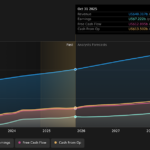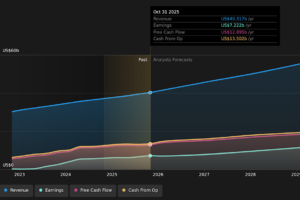
Oil futures remained sharply higher early Monday after the U.S. benchmark briefly topped the $130 level in electronic trade the previous evening as momentum builds for a ban on Russian oil imports.
Secretary of State Antony Blinken said Sunday the U.S. was considering an embargo of Russian oil imports “in coordination” with European and NATO allies in response to Moscow’s unprovoked invasion of Ukraine.
Price action
- West Texas Intermediate crude for April delivery CL00, +4.12% CL.1, +4.12% CLJ22, +4.12% was up $5.63, or 4.9%, at $121.31 a barrel on the New York Mercantile Exchange after trading as high as $130.50 on Sunday evening. WTI on Friday logged its biggest weekly gain on record, up 26.3%, based on data going back to 1983.
- Brent crude BRN00, +5.03% BRNK22, +5.03%, the global benchmark, was up $6.29, or 5.3%, to $124.38 a barrel, following a 25.5% weekly rise, also marking the strongest such percentage advance over a week on record, based on records going back to January 1991. Brent touched a Sunday peak of $139.13. Both WTI and Brent traded at levels last seen in 2008.
- April gasoline RBJ22, +3.89% rose 4.1% to $3.688 a gallon, while April heating oil HOJ22, +5.66% jumped 6% to $4.004 a gallon.
- April natural-gas futures NGJ22, +1.91% were up 1.7% to $5.10 per million British thermal units.
Market drivers
Speaking on CNN’s “State of the Union,” Blinken said the White House is reviewing the prospect of banning Russian oil imports, in coordination with European allies, while attempting to mitigate the impact of any such ban on global supplies, which could drive already-lofty prices further higher.
Read: U.S. stock futures sink Sunday as U.S. and its allies consider ban on Russian oil imports
“The market was already factoring in supply tightness due to voluntary import curbs by some buyers and logistical issues around the Black Sea; however, any official restrictions on Russian crude could make it further challenging to balance the oil market given that Russia is one of the major crude oil suppliers to Europe and Asia,” said Warren Patterson, head of commodities strategy at ING, in a note.
See: Gas in U.S. tops $4 a gallon, on average, for first time since 2008
“U.S. imports of Russian crude oil are relatively small at an average of around 198,000 [barrels a day] in 2021 (contributing only around 3% of total U.S. imports) and restrictions on only U.S. imports may not be detrimental to global crude oil supplies in the immediate term, although this could continue to support sentiment,” he wrote.
Also read: As U.S. lawmakers push to ban Russian oil, analyst sees ‘limited impact’ on prices for Americans
That said, there has already been an implicit ban of Russian crude, with prospective buyers shunning crude out of Russia.
Helima Croft, head of global commodity strategy at RBC Capital Markets, in a Thursday report, noted that Russian oil is facing an de facto embargo as the U.S. and its allies have imposed tough sanctions on major Russian banks, blocking them from the crucial SWIFT interbank messaging service for Moscow’s invasion of Ukraine on Feb. 24. The sanctions avoided crude sanctions amid rising inflation being faced by the U.S. and much of the world but momentum around enacting an energy ban is building, as Western nations aim to curb the Kremlin’s military campaign in Ukraine and cripple it financially.
Croft said that Russia’s “already staggering” export losses could hit 3 million to 4 million barrels a day if Western powers follow through and impose the sort of energy-focused “secondary sanctions” that were aimed at Iran.
Read more: Why Russian oil can’t find buyers even as crude soars above $100 a barrel
Meanwhile, Bloomberg reported on Sunday that Saudi Arabia raised prices for all regions, hiking its Arab Light crude for next month’s shipments to Asia to $4.95 a barrel above the benchmark it uses.
Doubts about achieving a nuclear disarmament agreement between Iran and world powers also was helping to push prices of crude higher, Reuters reported. A nuclear accord could see Tehran pour fresh supply onto the market.











